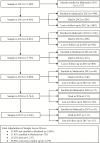Financial Stress and Risk for Entry into Medicaid Among Older Adults
- PMID: 31637314
- PMCID: PMC6794277
- DOI: 10.1093/geroni/igz040
Financial Stress and Risk for Entry into Medicaid Among Older Adults
Abstract
Background and objectives: Spending in the Medicaid program is a significant concern to both state and federal policy makers. Medicaid spending is driven by program enrollment and services use. Older adults with high health care needs incur a disproportionate proportion of program spending. This analysis identifies factors that place older Medicare beneficiaries at increased risk for entering into Medicaid.
Research design and methods: We use multinomial logistic regression and the 2011-2017 National Health and Aging Trends Study (NHATS) to examine the risks among older Medicare beneficiaries for entering into Medicaid over a 6-year follow-up period. We examine both time-invariant and time-varying factors to measure the impact of social and health and functioning changes at older ages.
Results: The risk of entry into Medicaid was higher for older adults who relocated to a nursing home (relative risk ratio [RRR]: 7.75; 95% confidence interval [CI]: 5.33-11.26) or other residential care setting (RRR: 1.36; 95% CI: 0.96-1.92) compared to those who remained in traditional community settings. Older adults who reported skipping a meal in the last month because there was not enough money to buy food were 2.4 times (95% CI: 1.10-5.21) more likely to enter Medicaid than those who did not. Similarly, older adults who reported not having enough money to pay household utility bills in the last year were 1.89 times (95% CI: 1.08-3.30) more likely to enter Medicaid.
Discussion and implications: Study findings suggest that trouble paying for basic needs increases the risk of entry into Medicaid. Further research is required to examine whether addressing these needs through improved access to social services that enable older adults to live safely in their home may delay or mitigate entry into Medicaid.
Keywords: Long-term services and supports; Public programs; Social determinants of health.
© The Author(s) 2019. Published by Oxford University Press on behalf of The Gerontological Society of America.
Figures
Similar articles
-
Medicaid Becomes the First Third-Party Payer to Cover Passive Remote Monitoring for Home Care: Policy Analysis.J Med Internet Res. 2018 Feb 21;20(2):e66. doi: 10.2196/jmir.9650. J Med Internet Res. 2018. PMID: 29467120 Free PMC article.
-
Medicaid Cost Savings of a Preventive Home Visit Program for Disabled Older Adults.J Am Geriatr Soc. 2018 Mar;66(3):614-620. doi: 10.1111/jgs.15143. Epub 2017 Nov 22. J Am Geriatr Soc. 2018. PMID: 29165789 Clinical Trial.
-
The Financial Hardship Faced by Older Americans Needing Long-Term Services and Supports.Issue Brief (Commonw Fund). 2019 Jan 1;2019:1-12. Issue Brief (Commonw Fund). 2019. PMID: 30695855
-
Implications of access, utilization and need for oral health care by the non-institutionalized and institutionalized elderly on the dental delivery system.J Dent Educ. 1993 Dec;57(12):876-87. J Dent Educ. 1993. PMID: 8263235 Review.
-
Benefits Trafficking: human trafficking of older adults and adults with disabilities.Front Rehabil Sci. 2024 Jan 22;4:1305926. doi: 10.3389/fresc.2023.1305926. eCollection 2023. Front Rehabil Sci. 2024. PMID: 38317778 Free PMC article. Review.
Cited by
-
Racial/Ethnic Differences in Health-Related Quality of Life in Persons With and Without Dementia.J Am Geriatr Soc. 2021 Mar;69(3):629-636. doi: 10.1111/jgs.16908. Epub 2020 Nov 12. J Am Geriatr Soc. 2021. PMID: 33184835 Free PMC article.
-
Examining Medicaid Participation and Medicaid Entry Among Senior Medicare Beneficiaries With Linked Administrative and Survey Data.Med Care Res Rev. 2023 Feb;80(1):109-125. doi: 10.1177/10775587221101297. Epub 2022 Jun 22. Med Care Res Rev. 2023. PMID: 35730585 Free PMC article.
-
Perspectives on the Challenges of Planning for and Accessing Long-Term Dementia Care Services Through Medicaid and Medicaid Waivers.J Appl Gerontol. 2025 Apr 28:7334648251333181. doi: 10.1177/07334648251333181. Online ahead of print. J Appl Gerontol. 2025. PMID: 40294891 Free PMC article.
References
-
- Bennett A. D., Curtis P., & Harrod C. S (2018). Bundling, benchmarking, and beyond: Paying for value in home- and community-based services Retrieved from https://www.milbank.org/publications/bundling-benchmarking-and-beyond-pa...
-
- Bipartisan Budget Act of 2018, H.R.1892, Congress (2018). Retrieved from https://www.govtrack.us/congress/bills/115/hr1892/summary
Grants and funding
LinkOut - more resources
Full Text Sources


